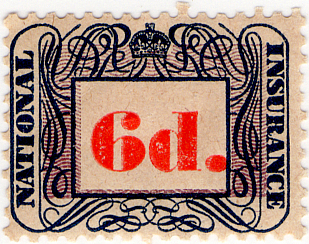It’s time to top up your UK pension entitlement

Back in the day, you proved your entitlement to a pension by buying actual stamps and sticking them in a book. This one's from 1948, the year of creation of the National Health Service
IN THE UK, your entitlement to a State Pension depends on your record of National Insurance (NI) contributions. It has, however, been possible to get away without paying your "Class 2" contributions - those that determine your eligibility for a State Pension. It is vitally important that you check your NI record and fill in any gaps. There is a limit on how far back you can do this. Miss the deadline, and you lose out on your pension.
You can currently fill in gaps as far back as 2006 and you have until 5 April 2025 to do so.
The standard basic UK state pension for a single person is £221.20 per week. It is payable from your 66th birthday if you were born on or before 5 April 1960, provided that you have paid at least 35 years of NI contributions. If you have fewer years of contributions you get less; if you have fewer than 10 years you may get nothing.
After 5 April 2025, as things stand you will be able to top up contributions only for the past six years.
In other words, on that date your contribution record for the years 2006 to 2019 will be locked.
So take advantage of the extended deadline. The people at moneysavingexpert.com reckon that you may get back ten times what you pay in.
Political confusion
Her Majesty's Government in its wisdom confused the issue by ceasing to demand "Class 2" contributions from freelances in April 2024. How little any journalist understood what the government had done was demonstrated by reactions to the Tory Party promising, if re-elected, to "abolish" the "Class 4" contributions as well.
How it currently works is this: people with self-employed profits of at least £6725 per year are "treated as having paid" Class 2 contributions.
People with lower profits can - and almost certainly should - pay voluntary contributions.
- 15 June 2024 Improved the description of what the government did in April 2024.
 Tax and National Insurance Freelance Fees Guide
Tax and National Insurance Freelance Fees Guide
 Benefits and pensions Freelance Fees Guide
Benefits and pensions Freelance Fees Guide
 Voluntary National Insurance .gov.uk
Voluntary National Insurance .gov.uk
 Aged 40 to 73? Urgently consider buying national insurance years moneysavingexpert.com
Aged 40 to 73? Urgently consider buying national insurance years moneysavingexpert.com
![[Freelance]](../gif/fl3H.png)